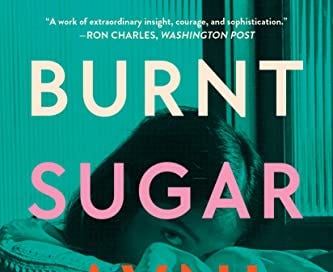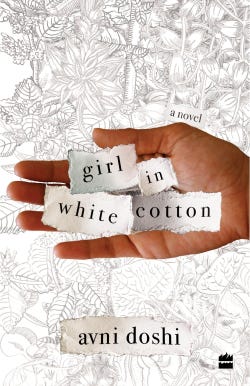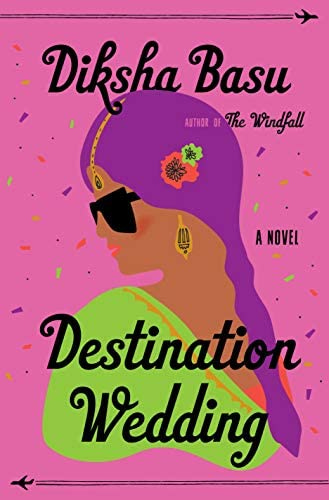#11// victorian watches, flaky breads & booker news
Dear Reader,
I have been caught up in a busy spell. Time is no longer a concept now. (Is it?). Well, you know I beat my head over nice intros. (Is there a secret book for making them interesting?). So let's cut straight to the chase. This week’s recommendations—
Read
“I would be lying if I say my mother’s misery has never given me pleasure” So begins Girl in White Cotton, also called Burnt Sugar in international markets. In India Girl in White Cotton was published by Harper Collins. If you haven’t read the book yet, NOW is the time. My own copy is dogeared on every other page with many pencil marks and underlines (is that a word?). Let me say I am very excited to see Avni Doshi on this year’s Book Prize long list for Burnt Sugar, announced earlier this week. I also think the new cover is stunning—it is a cover that makes me don't know what to expect.
Read this novel when you have the time to spare, and reflect. This is a deep dive into mother-daughter relationships that suffocate but are also interdependent. There’s the ‘otherness of self’ and finding traces of the other in self. Guilt, secrets, art projects and reckless love pour over you. There are shocks, like the time the mother decides to live like a beggar even though she has another choice. But there are also moments—not warm, not comfortable—and long silences. Doshi goes through role reversals in taking care of the other. You wonder, how do they love? How do they dislike? You want to extend a hand, but then you’d rather just watch the claustrophobia because some things are just the way they are. I wanted to get inside a room with this mother and daughter and simply stare, as they stare at each other. Really, really good.
Update about Destination Wedding by Diksha Basu:
I enjoyed it! The title might be a bit misleading because even though the whole novel happens over an Indian wedding, it is more about the guests who attend the wedding. Well there are a few behind the scenes, and those were perfect enough for me. Basu is her usual self as she was in The Windfall—witty, sarcastic, observant. The rich elite of Delhi, reality show brain dumps, wedding event managers, matchmakers, older folks falling in love, divorcees-to-friends etc etc. I thought the main character’s crushes were all around the place and sometimes I did want to scream ‘Why are you so confused’. Basu doesn’t give you lectures on what’s right and wrong but simply reports what we see around. And I like that. She has really nailed romance for the older generation (I kept relating to the older folks) and the complexities. Recommended if you are looking for a nice, breezy read that’ll give you laughs and some bigger things to think about.
Watch
Check this ULTIMATE list of NEW Malayalam movies on Hotstar that I compiled a while ago. It is categorised into drama, thrillers, comedy, romance, on-the-road etc so you can pick what suits your mood. I personally think the Thriller section is a great place to start.
Amazing links
- I read again this 2018 essay—one of my favourites—about how kimchi fried rice saved a coming out announcement day (Eric Kim, Food 52)
“It meant something to me that in the midst of my mother's grave disappointment, during a time in her life when everything had seemed to change, the rug pulled out from under her, somehow she and I could seek refuge in this one thing that would never change. I was still her son and she was still my mom, and kimchi fried rice—something only she could make—was still my favorite thing to eat in the entire world.”
- What do we lose when paratha is called "flaky bread," or bibimbap a "rice bowl"?—What’s in a name (Bettina Makalintal, Vice)
Roti gains new life as "whole wheat balloon bread" or "Asian flat croissant," and "Korean rice bowls" are a longer, more Westernized way of saying bibimbap. "Spicy chocolate milk simmered chicken" becomes a new phrase for mole, and chana masala is revised as Alison Roman's "spiced chickpea stew with coconut and turmeric," which internet colloquialism transforms into just "The Stew."
- Photo Essay : Why Club Cuisine Will Always Have a Place in Indian Culture (Sneha, Mallika, Goya Journal)
“Why should we turn our attention to these exclusive spaces, which the majority of people cannot even peek into? Because a chapter in the story of post-colonial Bombay can be told through this hotchpotch of foods. Club fare is a cuisine in its own right, albeit one without a geographical origin or formal history. The food, the social practices and the spaces designed around its consumption are a representation of the struggle embedded in a city once named Bombay, but now called Mumbai.”
- I love the Victorian era. So I decided to live in it (Sarah A Chrisman, Vox, 2015)
“We have a period-appropriate icebox that we stock with block ice. Every evening, and sometimes twice a day during summer, I empty the melt water from the drip tray beneath its base.
Every morning I wind the mechanical clock in our parlor. Each day I write in my diary with an antique fountain pen that I fill with liquid ink using an eyedropper. My inkwell and the blotter I use to dry the ink on each page before I turn it are antiques from the 1890s; I buy my ink from a company founded in 1670”
- This excellent personal essay by novelist Raven Leilani—who wrote the spectacular debut Luster released this year—‘When I left my Faith, I went to Comic Con’
“The first time I went to Comic Con I was looking for God…The decision to go to Comic Con was a hail Mary of sorts, a means to feel the kind of joy I felt when I was younger and more pious, and it took nothing at all to suspend my disbelief…My primary belief system had collapsed, but I missed the communion, the part of both religion and fandom that is based not in isolated practice, but in a fervor to share the good news.”
- Story series by Saraswathi Amma, one of the early feminist writers from South India, translated by J. Devika. Here’s The Sweetmeat (Reading Room co)
- Photo Essay : I Discovered A Toxic Valley In Romania, Here Are My 23 Eerie Photos (Andie Schwetz, Bored Panda)
The culprits for this ecological fate can no longer be held accountable and the current mine operators are now responsible, but in the end, they also must somehow live with the circumstances that were once created. For the rest of the people, it is better to find a new home early than late. Their homes will disappear forever in the muddy masses, but certainly not from their hearts.
I hope you are doing good.
Until next time,
Resh x
(This newsletter may contain affiliate links which might earn me a very small commission at no extra cost to you)
If you chanced upon this newsletter, you can subscribe here, forward to a friend or share via your favourite social media.







